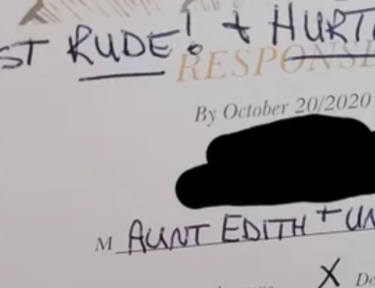Therapist Describes the Crucial Difference Between Support and ‘Toxic Positivity’
Ever find yourself venting about a problem to friend to get something off your chest, and their response is something along the lines of, “Just think positive!”
What happens when someone tells you to think positive? Do you actually think positive? Chances are, you don’t. In fact, chances are, hearing “think positive” to something you’re upset about actually makes you pretty mad.
But how can something genuine be so annoying? Obviously the friend saying to think positive doesn’t mean any harm. So why does it make our skin crawl?
One psychotherapist named Whitney Hawkins Goodman recently created a chart to explain why phrases along the lines of “think positive” can actually do more harm than good.
She refers to these types of phrases “toxic positivity.” While they’re technically positive phrases, telling someone to think positively without any way of doing so will do exactly the opposite. In fact, it might even make it seem like you’re not really listening or don’t really care, even if you do.
When you actually offer support to someone, it should be verbiage that offers actual positivity and help—something the person can use to make them feel better and think more positively.
Not sure what we mean? Let Dr. Goodman’s chart explain it.
On one side of her chart, she lists phrases that offer true validation and hope—things someone going through a tough time really needs to hear that will help. Next to those, she wrote the equivalent of what would qualify as “toxic positivity,” the non-helpful phrases.
In her first example, she lists, “This is hard. You’ve done hard things before and I believe in you,” as a phrase that offers validation and hope—aka this is something that would actually be helpful to someone sharing their feelings about something they’re going through.
The toxic equivalent? “You’ll get over it!” Clearly, this is not a phrase that does any good. It may come from a well-meaning place, but, as Dr. Goodman puts it, it’s toxic.
Her next example of validation and hope says, “I know there’s a lot that could go wrong. What could go right?” This is a great example of someone trying to reframe the problem into a positive light, which is helpful. The toxic equivalent: “Just be positive!” We don’t have to tell you how to feel about that one.
The chart has tons of these kinds of examples (which you can check out here) and really puts into perspective how to help someone in need. And we’re not the only ones who love it. The chart was met with so much enthusiasm from people all over the world, racking up nearly 20,000 likes on Instagram.
“The toxic positivity sounds very impersonal and lacks compassion,” someone noted, summing it up perfectly. “Anyone can say those phrases and not care.”
What do you think of Dr. Goodman’s chart? Do you agree with the two different ways of supporting someone? Have you ever had someone share a phrase of “toxic positivity” with you? How did it make you feel?




